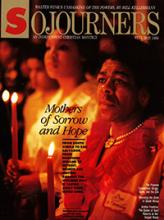Before his death, William Stringfellow had occasion to read Naming the Powers, the first volume of Walter Wink's in-process trilogy on the principalities and powers. Bill confided succinctly that it was "very good" and added with emphasis, "It's going to be an important book."
Little wonder he would think so. With exhaustive New Testament research, Wink confirms in the main what Stringfellow had intuited over the years through his own Bible study and writing on the powers. Wink indeed tips his hat to Bill Stringfellow periodically in these volumes, and specifically acknowledges conceiving the entire project way back in 1964 under the impetus of reading Stringfellow's Free in Obedience.
In keeping with Wink's identity and vocation, these are decidedly North American books, but not as in a vacuum. The first emerged after a long and depressing tour of Latin America. And he followed their completion with an extended trip to South Africa, where interest in the political import of his analysis is spreading. What remains to be seen is whether the trilogy will have the impact it portends for the biblical community right here in the United States.
That in itself is problematic. There are obstacles to be overcome. As a young seminary professor in New York, Wink published a pointed critique of the scholarly guild of biblical studies. He attacked their idol, the historical-critical method, pronouncing it "bankrupt" and in need of new management. That little book, The Bible in Human Transformation, became the manifesto of a minor Bible-study revival, heralding a dialogical method of communal study which draws on imagination and the assorted charismata of the subconscious (in balanced combination with critical analysis).
Read the Full Article

